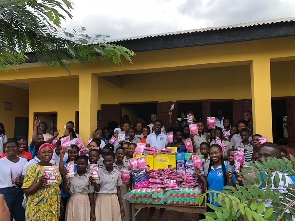The Office of the Women’s Commissioner for the Association of Students of Social Work - KNUST in collaboration with Curious Minds Ghana a youth led-advocacy group has organized a one-day workshop and donation at Apemso Community School in the Sekyere East District of the Ashanti Region to commemorate the worldwide menstrual hygiene day.
The event that sorts to train young girls on how to go about their monthly duties and also how to keep themselves clean during and after their periods saw speakers like Jemaimah Akiteyi, Dr. Edward Asamoah and Prince Kwesi Bonney advocating for the use of sanitary pads and the need to ensure proper hygiene by these teenage girls.
In speaking to the media at the event, Jemaimah Akiteyi articulated that, primarily, the workshop and donation were geared towards breaking taboos, myths and misconceptions surrounding menstruation, and also raising awareness of the importance of good menstrual hygiene management in rural communities.
Not only that but also anticipated that, at the end of the activity, students of Apemso Community School would have had enough education on menstrual hygiene management, how to properly wear the sanitary pad and be empowered to be advocates of change and peer mentors in their respective homes.
Jemaimah also emphasized that by addressing these misconceptions surrounding menstruation, the event above all aims to promote a more open and informed dialogue about menstruation and getting males into the conversation as a way of orienting their minds and making them appreciate that, menstruation is normal and part of the life of every girl or woman.
She also highlighted the significance of proper menstrual hygiene management, especially in rural communities where access to appropriate resources and information might be limited.
She further stated that the event aims to inspire students to become advocates of change and peer mentors. By educating and empowering the students, they can serve as catalysts for positive change in their respective homes and communities.
“I firmly believe that proper menstrual hygiene management is of utmost importance, particularly in rural communities where access to resources and information may be limited. It is crucial to address this issue comprehensively, ensuring that girls and women have the necessary knowledge, sanitary products, and supportive environments to manage their menstrual health with dignity. By promoting awareness and providing practical solutions, we can empower individuals and communities, breaking the barriers that hinder their well-being and progress.”
The representative of Curious Minds at the event, Prince Kwesi Bonney also appealed to civil society organisations to join forces in appealing to the government and relevant stakeholders to remove the taxes on sanitary pads so they can access to all since menstruation isn’t respected by social or financial status.
“It is crucial that we advocate for the removal of taxes on sanitary pads, making them accessible to all individuals. Menstruation is a natural process that affects women from all social and financial backgrounds, and it should not be a barrier to their well-being or education,” he stated.
In response to the future of the event, the women’s commissioner of the Association of Students of social work KNUST, Jemaimah Akiteyi, said the event will continue to raise awareness and educate more individuals (young people), not only in rural communities but also in urban areas.
By expanding its reach and organizing similar activities in different locations, the event can have a wider impact and reach a larger audience. The event will forge collaborations and partnerships with organizations, NGOs, like Curious Minds and government entities that work towards menstrual hygiene management and women's health. This can provide more resources, support, and sustainability to the event, allowing it to grow and make an even greater impact.
Health News of Tuesday, 30 May 2023
Source: Dennis Attuquayefio,Contributor

















